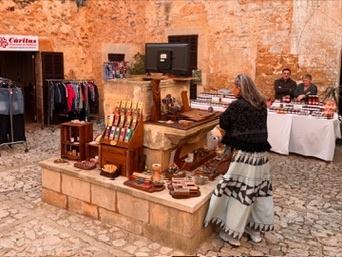What role does local agriculture play in Balearic food culture?
Similar Topics
local agriculture
balearic food culture
mallorca
traditional farming
culinary identity
sustainable practices
locally sourced ingredients
seasonal produce
farm-to-table
cuisine
Local agriculture plays a significant role in Balearic food culture, particularly in Mallorca, where traditional farming practices influence the region's culinary identity. The island's diverse climate and topography allow for the cultivation of a variety of fruits, vegetables, and herbs, including almonds, olives, tomatoes, and a wide array of citrus fruits. Additionally, the island is known for its vineyards, producing local wines, particularly the red and white varieties from indigenous grape types such as Manto Negro and Premsal Blanc.
Agricultural products are integral to traditional Mallorcan dishes, such as "sobrasada" (a cured sausage made with pork and paprika) and "ensaimada" (a sweet pastry), which often use locally sourced ingredients. Farming practices emphasize sustainability, with many local farmers adhering to organic methods and promoting the use of heirloom varieties. The close relationship between agriculture and cuisine is celebrated during local festivals and markets, where fresh produce is highlighted.
Furthermore, initiatives supporting farm-to-table practices have gained popularity, encouraging chefs to use seasonal and locally sourced ingredients. This emphasis on local agriculture not only sustains the regional economy but also fosters a strong sense of identity and community among the people of Mallorca. Overall, local agriculture is foundational to Balearic food culture, enriching it with flavors that reflect the island's unique landscape and heritage.
Agricultural products are integral to traditional Mallorcan dishes, such as "sobrasada" (a cured sausage made with pork and paprika) and "ensaimada" (a sweet pastry), which often use locally sourced ingredients. Farming practices emphasize sustainability, with many local farmers adhering to organic methods and promoting the use of heirloom varieties. The close relationship between agriculture and cuisine is celebrated during local festivals and markets, where fresh produce is highlighted.
Furthermore, initiatives supporting farm-to-table practices have gained popularity, encouraging chefs to use seasonal and locally sourced ingredients. This emphasis on local agriculture not only sustains the regional economy but also fosters a strong sense of identity and community among the people of Mallorca. Overall, local agriculture is foundational to Balearic food culture, enriching it with flavors that reflect the island's unique landscape and heritage.
🧩 Related Questions
Related Question
What types of wildlife are most commonly regulated under Mallorca's hunting permits?
Related Question
How can travelers identify the mastic shrub while exploring Mallorca's natural areas?
Related Question
How did the 19th-century horticultural trends impact the cultivation of the narrow-leaved monkey puzzle tree in non-native areas?
